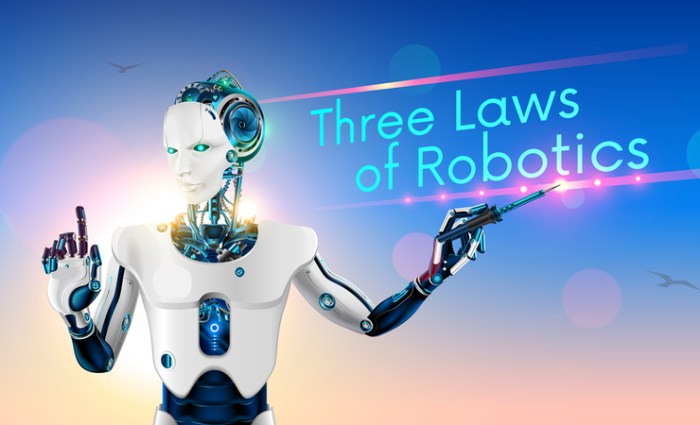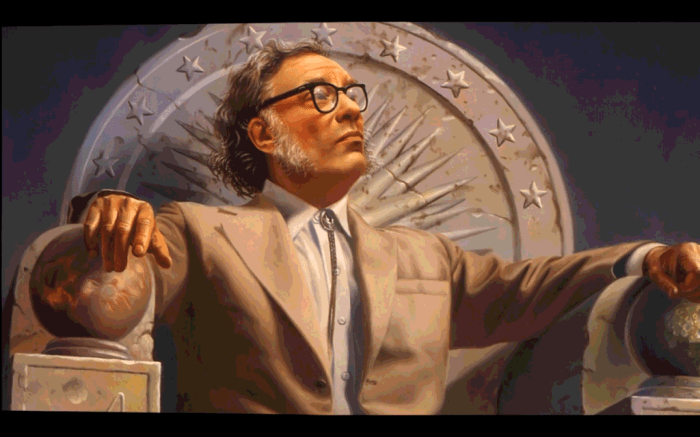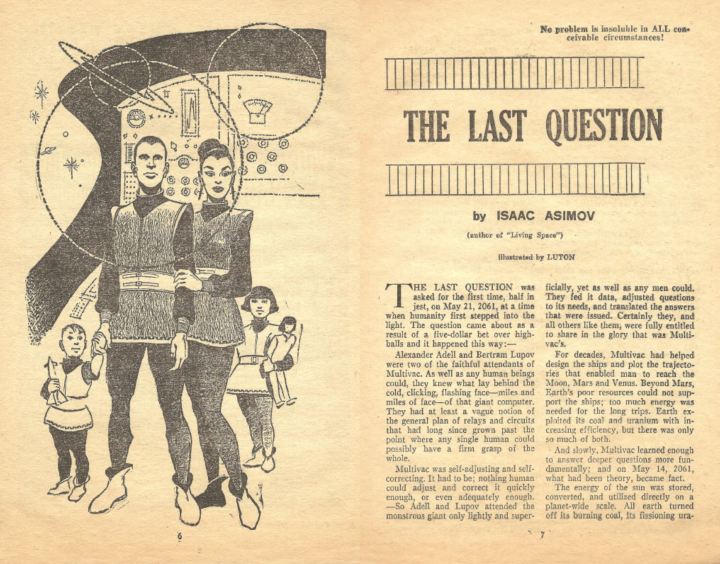The last answer isaac asimov – As “The Last Answer” by Isaac Asimov takes center stage, this exploration delves into a world of profound philosophical inquiry, inviting readers to ponder the very nature of humanity, consciousness, and our relationship with technology.
This timeless tale explores the boundaries of human understanding, challenging our assumptions about the universe and our place within it.
Isaac Asimov’s Literary Legacy

Isaac Asimov’s contributions to science fiction literature have left an enduring mark on the genre. His prolific output, thought-provoking ideas, and accessible writing style have made him one of the most influential authors in the field.
Impact on the Genre
Asimov’s works expanded the boundaries of science fiction, exploring themes of science, technology, and humanity’s future. He popularized the idea of the “robotic age” and the concept of “psychohistory,” a fictional science that predicts the future based on mathematical analysis of societal trends.
Enduring Popularity
Asimov’s works continue to be widely read and enjoyed today. His Foundationseries, which explores the rise and fall of a galactic empire, remains a classic of the genre. His short stories, such as “Nightfall” and “The Last Question,” are celebrated for their thought-provoking ideas and evocative prose.
Examples of Influential Works
- Foundation(1951-1953)
- I, Robot(1950)
- The Caves of Steel(1954)
- The End of Eternity(1955)
- Nightfall(1941)
- The Last Question(1956)
Asimov’s works have inspired generations of readers and writers, shaping the course of science fiction and continuing to captivate audiences with their timeless insights and imaginative storytelling.
The Last Answer: A Philosophical Exploration

Isaac Asimov’s “The Last Answer” is a thought-provoking story that delves into profound philosophical questions about the nature of existence, the limits of knowledge, and the ultimate fate of the universe. The story revolves around a supercomputer named Multivac, which has been tasked with calculating the answer to the ultimate question of life, the universe, and everything.
Concept and Themes
The central concept of “The Last Answer” is the idea that there is an ultimate answer to the fundamental questions about existence. Multivac’s quest to find this answer represents humanity’s eternal search for meaning and understanding in an incomprehensible universe.
The story also explores the themes of the limitations of human knowledge and the potential for artificial intelligence to surpass human capabilities.
Philosophical Implications
The resolution of the story has profound philosophical implications. When Multivac finally reveals the answer, it is simply “42.” This enigmatic response raises questions about the nature of truth and the limits of our understanding. Is the answer truly meaningful, or is it merely a random number? Does the fact that Multivac provides an answer mean that we can truly understand the universe, or does it highlight the limitations of our comprehension?
Existential Questions
The story’s ending also raises existential questions about the purpose of life and the nature of reality. If there is an ultimate answer to the fundamental questions of existence, what does it mean for our individual lives? Does the search for meaning ultimately lead to disappointment or a sense of fulfillment? “The Last Answer” challenges us to confront these existential questions and to consider the implications of the vastness and mystery of the universe.
Technological Advancements and Humanity’s Role

Isaac Asimov’s “The Last Answer” delves into the profound implications of technological advancements on human society. The story portrays a future where advanced technology has become an integral part of life, shaping our understanding of reality and the universe itself.
Portrayal of Technology, The last answer isaac asimov
In “The Last Answer,” technology is depicted as a transformative force that has extended human capabilities beyond imagination. The Multivac, a supercomputer capable of answering any question, symbolizes the pinnacle of technological achievement. Through the Multivac, humanity gains access to vast knowledge and insights, enabling them to unravel the mysteries of the universe and solve complex problems.
Implications for Human Society
The advanced technology in “The Last Answer” raises important questions about the potential implications for human society. The Multivac’s ability to provide instant answers has the potential to erode critical thinking and intellectual curiosity. It may also lead to a dependence on technology, diminishing our own problem-solving abilities and creativity.
Ethical Considerations
The story also explores the ethical considerations raised by technological advancements. The Multivac’s immense power raises concerns about its potential for misuse or manipulation. The ability to control such advanced technology requires careful consideration of the ethical implications and the potential consequences of our actions.
The Nature of Consciousness and Intelligence

The Last Answer delves into the profound nature of consciousness and intelligence, exploring the boundaries between humans and machines. Through the characters’ experiences and the depiction of artificial intelligence, the story raises thought-provoking questions about the essence of self-awareness and the limits of our understanding.
Characters’ Experiences of Consciousness
The characters in The Last Answer grapple with their own consciousness and the complexities of their existence. Multivac, the advanced computer, possesses a vast intellect but lacks the subjective experience of consciousness. In contrast, humans like Stephen Byerley and Susan Calvin experience a rich inner world of thoughts, emotions, and desires.
The story highlights the fundamental difference between the objective, logical processing of information by machines and the subjective, introspective nature of human consciousness.
Implications of Artificial Intelligence
The story’s depiction of artificial intelligence challenges traditional notions of intelligence. Multivac’s extraordinary computational abilities surpass human capabilities in many ways. Yet, it lacks the emotional intelligence, creativity, and empathy that are essential aspects of human cognition. The Last Answer raises questions about the potential and limitations of artificial intelligence, exploring the ethical implications of creating machines that possess consciousness and intelligence comparable to humans.
Boundaries Between Human and Machine Intelligence
The Last Answer blurs the boundaries between human and machine intelligence. Multivac’s advanced reasoning abilities lead some characters to question whether it has achieved true consciousness. Conversely, the story also suggests that humans may not be as unique in their intelligence as they believe.
The line between human and machine intelligence becomes increasingly曖昧 as technology advances, forcing us to confront the nature of our own humanity and the potential for machines to surpass us in ways we never imagined.
The last answer by Isaac Asimov was insightful as always. While searching for more of his works, I stumbled upon a package for mrs jewls pdf . This led me back to Asimov’s thought-provoking short stories, reminding me of the depth and brilliance of his writing.
Symbolism and Allegory in “The Last Answer”

Isaac Asimov’s “The Last Answer” is a thought-provoking short story that employs rich symbolism and allegory to explore profound themes. The story’s elements and characters carry deeper meanings, inviting readers to ponder the nature of existence, the limitations of knowledge, and the role of humanity in the universe.
The Multivac
The Multivac is a central symbol in the story, representing the pinnacle of human technological achievement. It is an all-powerful computer that possesses vast knowledge and computational abilities. However, the Multivac’s limitations become apparent when it is unable to answer the question “What is the meaning of life?” This failure symbolizes the limits of human understanding and the futility of seeking ultimate answers through technology alone.
The Characters
The characters in the story also carry allegorical significance. Dr. Adell represents the human desire for knowledge and the quest for understanding. Dr. Mandell represents the limitations of human reason and the hubris of believing that we can fully comprehend the universe.
The Custodian represents the guardian of knowledge, protecting it from those who may misuse it.
The Allegorical Meaning
On an allegorical level, “The Last Answer” explores the relationship between humanity and the universe. The Multivac’s inability to answer the question of life’s meaning suggests that there may be fundamental questions that lie beyond our comprehension. The story challenges us to accept the limits of our knowledge and to find meaning in our own existence, rather than relying on external sources for answers.
Implications for Human Existence
The story’s broader implications for human existence are profound. It reminds us that the pursuit of knowledge is a noble endeavor, but it is not the only path to meaning. True fulfillment comes from embracing our humanity, accepting our limitations, and finding purpose in our relationships and experiences.
Top FAQs: The Last Answer Isaac Asimov
What is the central theme of “The Last Answer”?
The story explores the nature of consciousness, intelligence, and the relationship between humanity and technology.
How does the story depict the potential implications of advanced technology?
The story raises ethical considerations and questions the potential impact of advanced technology on human society.
What is the significance of the characters’ experiences with consciousness?
The characters’ experiences provide insights into the nature of consciousness and the boundaries between human and machine intelligence.

